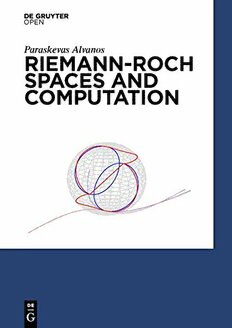Table Of ContentParaskevasAlvanos
Riemann-RochSpacesandComputation
Paraskevas Alvanos
Riemann-Roch
Spaces and
Computation
|
Managing Ediror: Aleksandra Nowacka-Leverton
Associate Editor: Dimitris Poulakis
Language Editor: Nick Rogers
PublishedbyDeGruyterOpenLtd,Warsaw/Berlin
PartofWalterdeGruyterGmbH,Berlin/Munich/Boston
ThisworkislicensedundertheCreativeCommonsAttribution-NonCommercial-NoDerivs3.0license,
whichmeansthatthetextmaybeusedfornon-commercialpurposes,providedcreditisgiventothe
author.Fordetailsgotohttp://creativecommons.org/licenses/by-nc-nd/3.0/.
Copyright©2014ParaskevasAlvanos
publishedbyDeGruyterOpen
ISBN978-3-11-042613-7
e-ISBN978-3-11-042612-0
BibliographicinformationpublishedbytheDeutscheNationalbibliothek
TheDeutscheNationalbibliothekliststhispublicationintheDeutscheNationalbibliografie;
detailedbibliographicdataareavailableintheInternetathttp://dnb.dnb.de.
ManagingEditor:AleksandraNowacka-Leverton
AssociateEditor:DimitrisPoulakis
LanguageEditor:NickRogers
www.degruyteropen.com
Coverillustration: ©ParaskevasAlvanos
Contents
Preface|VIII
Part I: Riemann-RochSpaces
1 ElementsofAlgebra|2
1.1 Domains|2
1.2 RingsandFields|9
1.3 NormandTrace|13
1.4 GroupofUnits|15
2 FunctionFieldsandCurves|17
2.1 AlgebraicFunctionFields|17
2.2 AffineCurves|19
2.3 ProjectiveCurves|23
2.4 GenusofaCurve|27
3 Riemann-RochSpaces|32
3.1 ValuationRings|32
3.2 PlacesandDivisors|36
3.3 Riemann-RochSpace|39
3.4 HolomorphyRings|41
4 IntegralDomains|44
4.1 FractionalIdeals|44
4.2 Localization|46
4.3 R-moduleV|50
Part II: Computation
5 ComputingIntegralBases|54
5.1 Discriminant|54
5.2 IdealBasis|56
5.3 Idealizer|58
5.4 Radical|60
5.5 ComputingtheDiscriminantsIdealRadical |61
5.6 ComputingIdealizersandInverseIdeals|64
5.7 Trager’sAlgorithm|66
5.8 Examples|67
6 ComputingRiemann-RochSpaces|73
6.1 ReducedBasisAlgorithms|73
6.2 TheDimensionofL(D)|79
6.3 ComputingL(D)|81
7 ComputingResultantandNormFormEquations|85
7.1 Resultant|85
7.2 ComputingN (x a +···+x a )=k|90
L/K 1 1 n n
7.3 Examples|92
8 ComputingIntegralPointsonRationalCurves|98
8.1 IntegralPointsonCurves|98
8.2 IntegralPointsonCurveswith|Σ (C)|≥3 |99
∞
8.3 IntegralPointsonCurveswith|Σ (C)|=2(i) |106
∞
8.4 IntegralPointsonCurveswith|Σ (C)|=2(ii)|109
∞
8.5 IntegralPointsonCurveswith|Σ (C)|=1 |112
∞
Appendices|115
A UnimodularMatrices|115
A.1 TransformationMatrix|115
A.2 UnimodularTransformations|116
B Algorithm’sCodes|118
B.1 IntegralPoints3Algorithm’sCode |118
B.2 IntegralPoints2iAlgorithm’sCode |126
B.3 IntegralPoints2iiAlgorithm’sCode |129
B.4 IntegralPoints1Algorithm’sCode |133
Bibliography|136
Index|139
IndexofAlgorithms|141
|
Tomy"Flower"
Στο῾῾Τζατζούρι᾿᾿μου
Preface
Riemann-Rochspaceisafieldoffunctionswithapplicationsinalgebraicgeom-
etryandcodingtheory.Thistextbookisfocusedontheoryandoncomputationsthat
arerelevanttoRiemann-Rochspaces.Itisnotedthatforthecomputationofintegral
points on curves, the study of a Riemann-Roch space is necessary (Alvanos et al.,
2011;Poulakisetal.,2000;Poulakisetal.,2002).Besidesthecomputationofintegral
pointsoncurves,computationofRiemann-Rochspacesareusedfortheconstruction
ofGoppacodes(Goppa,1981;Goppa,1988),symbolicparametrizationsofcurves(Van
Hoeij,1995;VanHoeij,1997),integrationofalgebraicfunctions(Davenport,1981)and
alotmore(Hirenet.al,2005).
Riemann-RochspacearisesfromtheclassicalRiemann-Rochtheoremwhichcom-
putesthedimensionofthefieldoffunctionswithspecificzerosandpoles
dimD=degD−g+1+i(D).
Here D isadivisor, g isthegenusofthefunctionfieldand i(D)aninvariantofthe
functionfield.Theinequality
dimD≥degD−g+1
wasinitiallyprovedbyRiemann(1857)andwasupgradedtoequalitybyRoch(1865).
Thescopeofthetextbookisnottoaddoriginalresearchtotheliteraturebuttogive
aneducationalperspectiveonRiemann-Rochspacesandthecomputationofalgebraic
structuresconnectedtoRiemann-Rochtheorem.Theproofsoftheoremsthatusestiff
techniquesareavoided,andproofswitheducationalvalue(accordingtotheauthor’s
opinion)arepresented,allowingthereadertofollowthebookwithoutmanydifficult
computation.Inordertofollowthetextbook,thereadershouldbeawareofthebasic
algebraicstructuressuchasgroup,ring,primeideal,maximalideal,numberfield,
modules,vectorspacesandthebasicsoflinearalgebra,matrixtheoryandpolynomial
theory.
Thefirstpartofthetextbookconsistsoffourchapterswherealgebraicstructures
andsomeoftheirpropertiesareanalysed.Thesecondpartofthetextbookconsists
offourmorechapterswherealgorithmsandexamplesconnectedtoRiemann-Roch
spacesarepresented.Throughoutthetextbookavarietyofexamplescoverthemajor-
ityofthecases.
Thistextbookisarésuméoftheauthor’sworkandhisresearchthelast15years.
Therefore,theauthorwouldliketothankallofhiscolleaguesandfriendsthathelped
himineverywayduringthoseyears.Especially,theauthorwouldliketoexpresshis
deepgratitudetohisbelovedwife,K.Roditou,forhercommentsandhersupportdur-
ingthewritingofthistextbook.Theauthorwouldalsoliketothankverymuchthe
refereesfortheircorrectionsandtheirverythoughtfulandusefulcommentsandK.
Chatzinikolaouforhissuggestionsaboutthedesignofthecover.Lastbutnotleast,
©2014ParaskevasAlvanos
ThisworkislicensedundertheCreativeCommonsAttribution-NonCommercial-NoDerivs3.0License.
Preface | IX
theauthorwouldliketoexpresshisultimaterespecttohisformersupervisorandcur-
rentmathematicalmentorprof.D.Poulakis.
1 Elements of Algebra
Inthisfirstchapterweintroducethealgebraicstructuresthatwillbeusedinthe
followingchapters.Definitionsareenrichedwithlotsofexamplesandfiguresforbet-
terunderstanding.Wewillonlydealwithcommutativeringsandnumberfieldsand
thereforeeveryreferencetoaringorafieldimpliesacommutativeringandanumber
fieldrespectively.
1.1 Domains
Inthissectionweinvestigatesomebasicpropertiesofdomainsthatareusedthrough-
outthetextbook.Startingwiththealgebraicstructureofthecommutativeringand
addingpropertiestoit,weestablishthealgebraicstructureofthefield.
Definition AcommutativeringRiscalledanintegraldomainifforanytwoelements
a,b∈R,a·b=0impliesthata=0orb=0.
Thedefinitionofintegraldomainisnecessaryinordertohaveadomainwheredivis-
ibilitycanoccur.Asweknowthesetofn×ninvertiblematrices,wheretheidentity
elementoftheringistheidentitymatrixandthezeroelementoftheringisthezero
matrix,formacommutativering.TheproductoftwomatricesA,Bmightbethezero
matrixwhileneitherofAandBarezeromatrices.Forinstance
(cid:34) (cid:35) (cid:34) (cid:35) (cid:34) (cid:35)
0 0 2 0 0 0
· =
0 2 0 0 0 0
Thus,theringofn×ndiagonalmatricesisnotanintegraldomain,eventhoughitis
acommutativering.Allfields,theringofrationalintegersZandallthesubringsof
integraldomainsareintegraldomains.
Proposition1.1.1. IfRisanintegraldomainthenR[x]isalsoanintegraldomain.
Proof. InordertoprovethatR[x]isanintegraldomainitisequivalenttoprovethat
foranytwoelements
f(x)=a xn+···+a x+a , a ≠0
n 1 0 n
and
g(x)=b xm+···+b x+b , b ≠0
m 1 0 m
iff(x)g(x)=0thenf(x)=0org(x)=0.Theproductf(x)g(x)is
f(x)g(x)=a b xn+m+···+(a b +a b )x+a b =0.
n m 1 0 0 1 0 0
Thusa b =0,whichisacontradiction.
n m
©2014ParaskevasAlvanos
ThisworkislicensedundertheCreativeCommonsAttribution-NonCommercial-NoDerivs3.0License.

